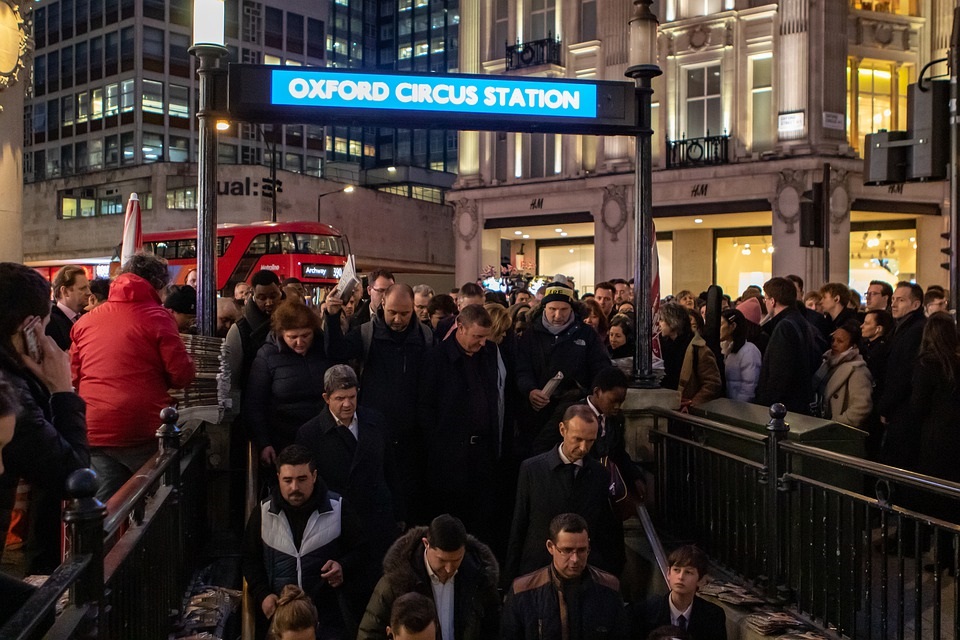In the United Kingdom there are several organizations that work with and for this community. Their purpose is to ensure that the diaspora has a dignified and productive life, where their rights are respected and where living in and adapting to a new country is as painless as possible. Some have become indispensable arenas of support for migrants.
 Mónica del Pilar Uribe Marín
Mónica del Pilar Uribe Marín
On 31 January 2020, the United Kingdom officially withdrew from the European Union. That same month, Covid-19 arrived on the island and on 23 March, the then Prime Minister Boris Johnson announced the first lockdown. From then on, the virus spread and changed the lives of the inhabitants.
A year later, on 1 January 2021, the UK adopted a new immigration system and, with it, a series of measures that would affect the diaspora. Then, in February, came the war in Ukraine and its international geopolitical, humanitarian and economic impact. On top of all this came rising inflation (now at 11.1%, the highest in 40 years), decapitated public finances and an impending economic recession. And of course the inevitable and increasingly desperate austerity measures.
Against this background, which is already difficult for UK nationals, the situation for most immigrants has become untenable, especially for non-Europeans. Not having papers authorising them to live in this country, or not speaking English, makes it difficult for them to integrate into the host community.
The way they cope with this reality is through friends, family, work colleagues and even individually.
In the case of the Latin American community, they have very strong ties of conviviality and solidarity that help them to overcome difficulties.

Nevertheless, there are Latin American bodies and organizations that work for and with immigrants, most of which work as individuals, although others have come together (for example, the Coalition of Latin Americans in the UK, Clauk).
Whether grouped or not, there are organizations that are representative for their work, history and way of serving the community. The Prisma spoke with three of them that, because of their work, lifetime and practice, have become important places for Latin American immigrants.
Aymara
One of them is Aymara, an organization that emerged during the pandemic, in 2019, with Carlos Corredor and José Trueba in charge. It was born when the deterioration of the living conditions of the most disadvantaged ethnic minority groups became more clearly visible. Since then, they say, it has been applying an innovative business model and a very effective methodology to cover those most in need.
For them, the key is access to health services. Once the individual “is a user of the public health system, their migratory situation is reviewed and access to decent accommodation is facilitated. Then their training needs are analysed, and solutions are provided to facilitate their adaptation and increase their chances of insertion in the regulated labour market”. All efforts are focused on strengthening their self-esteem and confidence in order to preserve their emotional health.
For this last phase, Aymara has a wide network of social leaders who, having had a difficult past but having managed to overcome it, can now share their success story and be an example to others.
In 2022 they focused, among other activities, on consolidating the provision of sexual health services for people at high risk of HIV and sexually transmitted diseases; designing reproductive health and domestic violence services for their next launch, including seeking strategic partners; and increasing the critical mass of the current business to provide services to ethnic groups other than Latin Americans in the medium term.
 In Carlos Corredor’s opinion, because of their origin and history, Latin Americans are particularly resilient and able to adapt to conditions of great need.
In Carlos Corredor’s opinion, because of their origin and history, Latin Americans are particularly resilient and able to adapt to conditions of great need.
However, their vulnerability has been affected by resource shortages in health services and budget cuts in community services.
Tougher legislation against irregular immigration, nationalism and radicalisation have not helped to reduce discrimination and stigmatisation for ethnic minorities, they say.
As for the Covid pandemic, they believe that it has seriously impacted people’s mental state, causing serious disruption to those already suffering from social exclusion. And finally, regarding the recent disproportionate increase in the cost of living, they point out that it is wreaking havoc on the household economies of low-income people, which in turn causes dislocation and uprooting.
Currently, Aymara is collaborating with academic institutions and research institutes to collect data on the needs of the Latin-American community and investigate possible solutions through working jointly with central and local government, private companies and community organizations.
For the coming year, they aim to provide services in all London boroughs where Latin Americans live, work or spend their leisure time. To this end, they have designed an ambitious plan for all those individuals who, for one reason or another, are unable to access free public services.
 Latin American House
Latin American House
It is one of the oldest Latin American organizations in the UK. It was founded almost four decades ago, in 1983, and today it is located in a London building in Kilburn.
We are talking about Latin American House (Casa Latinoamericana), which has been directed by Carlos Huascar Tapia Montes since September 2018.
From there, they are dealing with the problems of a community that is facing the difficult reality of the country in which they live today. In Tapia Montes’ opinion, it has become evident that the areas where people have the most problems are the cost of living and pensions, areas where demand has increased.
He says that the “new rules and conditions seem to make it more difficult for some people to get jobs or housing”.
Therefore, in 2022 the organization dedicated itself to helping disadvantaged and vulnerable people recover financially, physically and mentally) from the effects of the lockdowns and the pandemic.
At the same time, they worked to ensure the financial sustainability and resilience of the organization, while developing more services given the growing number of Latin Americans in London. And when they could not offer their support to their beneficiaries, they established collaborations and partnerships.
To this end, they created the “Communities and Cultures” programme, with the aim, says Carlos Huascar, of “bringing our communities together and improving the lives of the most disadvantaged and vulnerable, while promoting Latin American cultures and local artists”. They also increased its offer of social benefit counselling days: two days a week on a drop-in basis and two days a week on an appointment basis.
 It also increased its offer of social benefit counselling days: two days a week on a drop-in basis and two days a week on an appointment basis.
It also increased its offer of social benefit counselling days: two days a week on a drop-in basis and two days a week on an appointment basis.
In addition, it started the “Child and young people” programme (specifically targeting disadvantaged families, both from Latin American and other backgrounds) and established working partnerships with a reputable immigration law firm and a law school to offer informative workshops on topics such as labour rights.
This is important as one of the services they provide is immigration advice. They have also continued to assist non-EU migrants (but family members of EU citizens) to obtain permanent resident status through the EU Settlement Programme.
In the same way, they have helped many to improve their English language skills and access better jobs and sometimes better housing or living conditions.
Today they are collaborating with the University of Birmingham on a study on bilingualism: UK Heritage Spanish (@UKHeritageSpan).
On the other hand, it is directly involving Clauk (it is a member of this coalition) in a research project on “Community Engagement in Research” with the Centre on Migration Policy and Society at the University of Oxford (Compas).
 Lawrs
Lawrs
This is another long-standing organization and was founded by a group of Latin American women who realised that there was a lack of a body to address the needs of this sector of the population who “as women and as immigrants had specific and different needs”.
Thus, in 1983, Latin American Women’s Rights Service (Lawrs) was born and today continues to provide advice on social benefits and housing, labour rights and exploitation, immigration and gender-based violence; psychotherapy; integration activities and group activities (such as the group ‘Sin Fronteras’ for girls and young women and ‘Warmi’ for women activists).
Dolores Modern, Policy and Communications Manager on Labour Exploitation at Lawrs, explains that during the pandemic they expanded their team and services. “In this year of crisis, we managed to maintain the same level of support despite the challenges, responding to the growing demands and needs of a community vulnerable to the current crisis”.
In addition, they continued to work towards full access to rights for migrant women, in particular by campaigning for victims of crimes such as gender-based violence and labour exploitation to be able to report to the police safely, without fear of the police sharing their information with the Immigration Bureau.
For Dolores, 2022 was a year of increased attempts by the UK government to demonise migrant communities and limit their access to basic services. Two pieces of legislation in particular, passed by Parliament this year, “will increase the vulnerability of the Latin American community: the Nationality and Borders Act and the Police, Crime, Sentencing and Courts Act”.
During this period, she explains, the community has been hit hard by the cost-of-living crisis, with inflation at over 14% and no wage increase. This has made it difficult to cover the cost of housing, food and energy, and has increased dependency on food banks.
 In her opinion, the cost of living crisis also impacts communities such as Latin American communities in the sense of making them vulnerable to labour exploitation and unable to escape situations of domestic abuse. This crisis comes on top of the difficulties generated by the Covid-19 pandemic.
In her opinion, the cost of living crisis also impacts communities such as Latin American communities in the sense of making them vulnerable to labour exploitation and unable to escape situations of domestic abuse. This crisis comes on top of the difficulties generated by the Covid-19 pandemic.
In line with this, Laws is currently working on research on exploitation in domestic work in the UK and, together with IRMO, is working on a report on community access to health services. And Lawrs ends 2022 with their publication of “Preventing and Addressing Abuse and Exploitation: A Guide for Police and Labour Inspectors Working with Migrants”.
By 2022, it aims to continue to provide services, expand its immigration advice and work with girls and young women, and continue to work to influence legislation and public policy for the benefit of migrant women.
(Translated by Rene Phelvin – Email: renephelvin@gmail.com) – Photos: Pixabay












.jpg)












